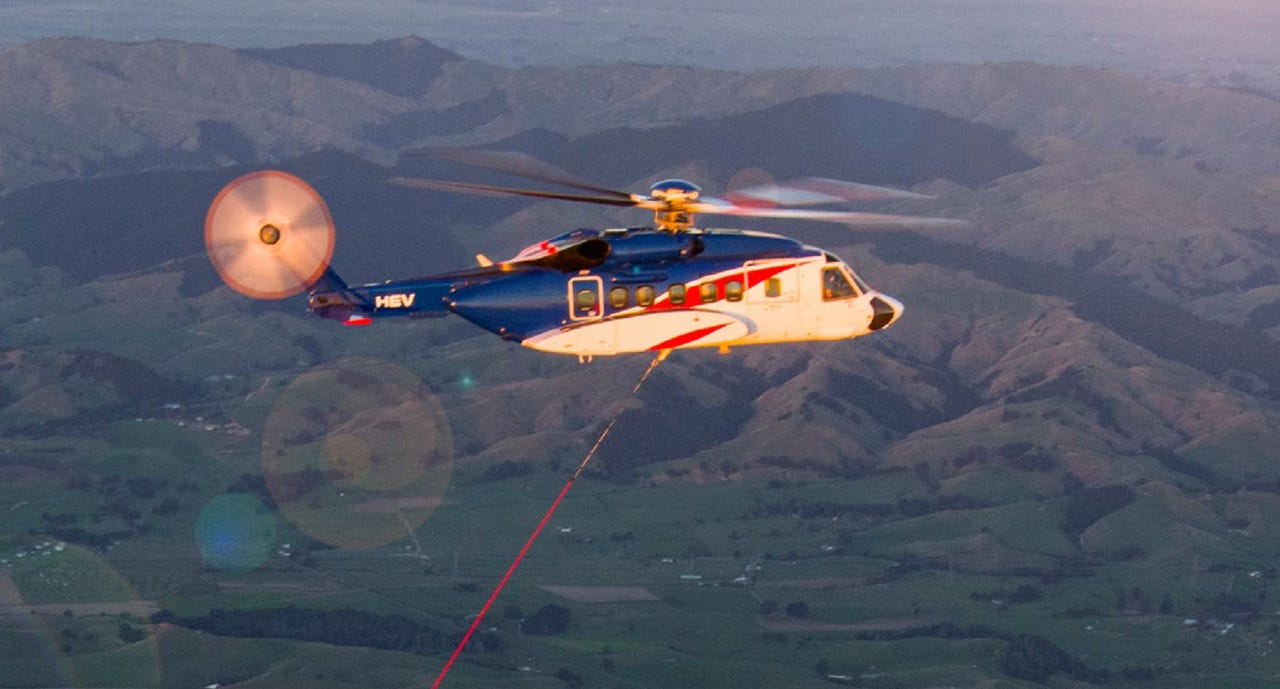
































Rocket Lab will use a customized Sikorsky S-92 to try to catch the second-stage rocket.
Rocket Lab USAIn the coming days, Rocket Lab USA will launch its two-stage Electron Rocket into space to deploy a few dozen satellites into orbit on behalf of six other companies. As Electron's second-stage rocket flies into orbit to get the job done, the first-stage rocket launcher will fall back to Earth -- and a helicopter will attempt to catch it.
Catching the returning rocket will be "a highly complex operation that demands extreme precision," the company said in a release.
Rocket Lab will provide a live broadcast of the wild mid-air capture at approximately T-20 minutes to launch. After weather delays, Rocket Lab said Friday that the company is aiming to launch no earlier than 1 May UTC. The company will attempt to provide a live view of the catch from the helicopter, though the remote location of the capture is likely to result in some video loss.
The weather has improved through the week, but the forecast is showing the best wind and cloud cover conditions a few days from now, so we're targeting no earlier than 1 May UTC / 2 May NZST for launch. ??https://t.co/cQNxac5Dqd pic.twitter.com/2AlhnzoY0Y
- Rocket Lab (@RocketLab) April 29, 2022
Founded in 2006, Rocket Lab has already delivered more than 100 satellites into orbit for customers across commercial, civil, defense, and academic sectors. This mission, dubbed "There and Back Again," will be the 26th launch of its Electron rocket. It's the first time, however, that the company will attempt to capture the Electron's first stage rocket with a helicopter. The mid-air capture would mark a major milestone in the company's efforts to make Electron a usable rocket.
"We're excited to enter this next phase of the Electron recovery program," Rocket Lab founder and CEO Peter Beck said in a statement. "We've conducted many successful helicopter captures with replica stages, carried out extensive parachute tests, and successfully recovered Electron's first stage from the ocean during our 16th, 20th, and 22nd missions. Now it's time to put it all together for the first time and pluck Electron from the skies. Trying to catch a rocket as it falls back to Earth is no easy feat, we're absolutely threading the needle here, but pushing the limits with such complex operations is in our DNA. We expect to learn a tremendous amount from the mission as we work toward the ultimate goal of making Electron the first reusable orbital smallsat launcher and providing our customers with even more launch availability."
SpaceX has pioneered the nascent move away from single-use rocket systems with the two-stage Falcon 9 rocket, which reignites its engines to return to Earth.
The Electron rocket will lift off from Pad A at Launch Complex 1 on New Zealand's M
 Tags quentes :
Inovação
Espaço
Tags quentes :
Inovação
Espaço